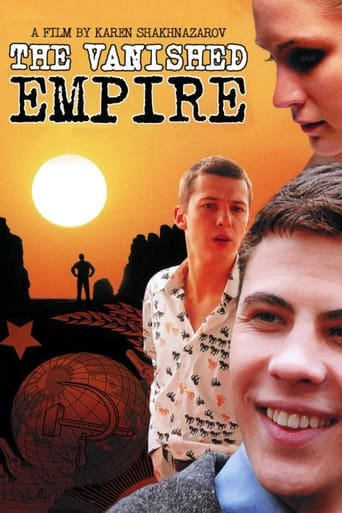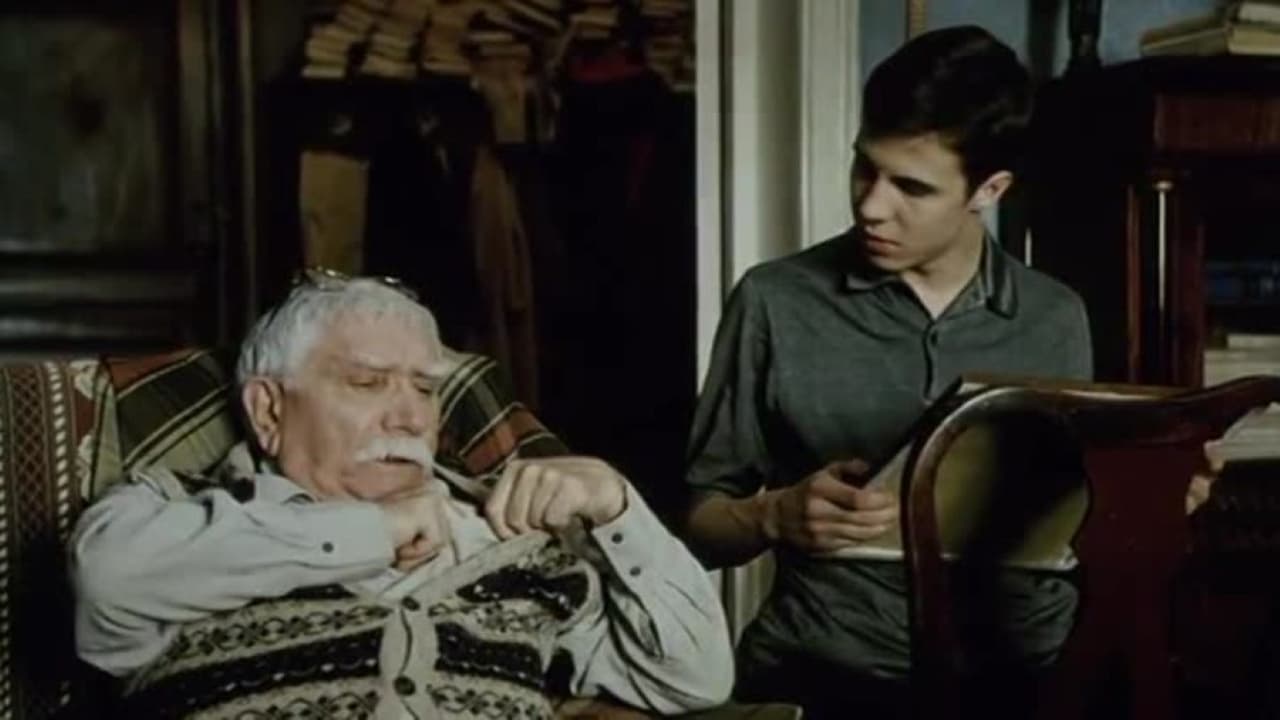yj270
This is the kind of film which captures the spirit of the age, which gives us an excellent cast playing characters who are all too real, in their world, over 35 years ago. Everything that one could have heard about Leonid Brezhnev's Soviet Union can be found here. Compared to today, it was an era where life was simpler, yet offered far less opportunities than the West. Despite the differences, by the end of this film, it is very easy to relate to the characters, especially Sergei Narbakov, the protagonist, and his friend, Stepan Molodtsov. Our humanity is a shared experience.The outstanding performance by the Armenian actor, Armen Dzhigarkhanyan, must not be overlooked, either. Alternating between old wisdom and very dry humor, he stands out as Sergei's grandfather. I have already recommended this film to friends who share with me an equal curiosity about the USSR, an acronym now consigned to history books.
FilmCriticLalitRao
Those who have been films by Russian director Karen Shakhnazarov will surely waste no time in recognizing certain similarities which exist in "Ischeznuvshaya Imperiya" and one of his old films "Kuryer" which was made in 1987.Both these films gives viewers outside of Russia a very basic yet subtle idea of what it takes to be a youngster in mighty Russia.Although music and young people can be found in both these films,it should be noted that these films must be analyzed using absolutely different ideological yardsticks.A word for those who have not seen old films by Karen Shakhnazarov.They should be requested to have an attentive look at them at the earliest in order to understand how Karen Shakhnazarov has nicely blended his love for music and Russian youth in most of his films.This is something which has given a distinct edge of lightness to the image of Russian cinema which has earned the dubious notoriety of following a recognizable pattern of serious,occult themes."The Vanished Empire" is a curious title which might induce funny ideas in inattentive viewers' heads but this film is only mildly critical of Russian state.The highlight of this film is its depiction of joys of friendship in true Russian style.If surprise end is any indication of a film's ingenuity then "The Vanished Empire" would surely win many a heart by being a truly heroic film showing the frustrations of hapless Russian youth.Film critic Lalit Rao interviewed MOSFILM studio CEO and Russian director Karen Shakhnazarov during a screening of this film at 13th International Film Festival of Kerala 2008 (IFFK) which organized a retrospective of his films.
jim smith
We see few Russian films here in the U.S. and our familiarity with modern day Russian life is limited. Here we get a view of life in the Brezhnev 1970s. "Vanished Empire" reassures us that the Russians are just like everybody else, save for social conditioning and a scarcity of consumer goods. It's convincing characters are warm, animated and full of very familiar foibles. But it is charming how readily family and friends "do" for each other there,enthusiastically.Yet this is a society so parched for Western-style consumer goods that a used Japanese radio can get a buddy out of police custody, a nice jacket plus gas money can induce a cab driver to take someone to the hinterlands and back.Sergey, the focal character, is well and charmingly rendered by young Aleksandr Lyapin. Like a lot of 18 year old college boys he is impulsive and easily suggestible. His romance with girlfriend Lyuda is in full bloom but a call from his comrades can make him forget his commitments to the lady. More than once Sergey shows that loyalty to his buddies trumps faithfulness to his lover.Sergey's inattention to those who love him and his hijinks in school are forgiven, up to a point, because of his youth and charm. But the carefree life and luck of a teenager cannot last. Life becomes serious and the due bill for self-centered presumptions is, inevitably, presented.The women characters in this film are long suffering. Though not ill-treated physically, they are never valued above male comradeship. Their needs are not thought of, or not taken seriously. Lyuda's treatment by Sergey reminded me of the comment of an American exchange student who had boyfriends in the Soviet 1970s. Asked if she ever considered marrying any of them, she said "No." She said that, in Russia, "a woman might be loved but she will never be respected." Jim Smith
RResende
I am Portuguese so, despite being born in the 80', i know a few things about a country trying to overcome its own memory. For those who don't know, Portugal was the late perpetrator in Europe of a fascist concept of "empire", a retro idea that stuck cultural life and true evolution for decades in some countries. It finished for us in the mid 70', but dealing with such a radical change of collective definition is something that drags to these days, watered by an upgrade in the Portuguese general living conditions, but still there.Now i think the Soviet experiment was probably more radical and fundamentalist to its populations than the Latin European fascisms. And it lasted longer. So, dealing with the radical shift towards a forced "western democracy" approach is probably a painful process for the ex soviet territories, mostly the russians. That's the frame where i place this specific picture. I watched it as an exorcism of past phantoms, but also a blinking melancholic eye to those days.The facts in the story, which is casual (it is here as a 'typical' repetitive case, in those days) all speak against what was happening in that regime in that context, but yet it avoids moralizing. No one is judged (unlike, for example, in "The lives of the others") and no one is innocent. It's a kind of approach that assumes that we must feel what was going on regardless of the upper political or power contexts that forged what we see. I accept that vision, i enjoyed it. The cinematic options here were fully coherent to what we saw, and from time to time i saw Tarkovsky here, who has much to do with how cinema bends memory. Nice to remember a social context, a certain youth i never got to know, and a certain kind of cinema that is sweet and sometimes (not this case) deep and life-altering.My opinion: 3/5 FantasPorto http://www.7eyes.wordpress.com


 AD
AD



